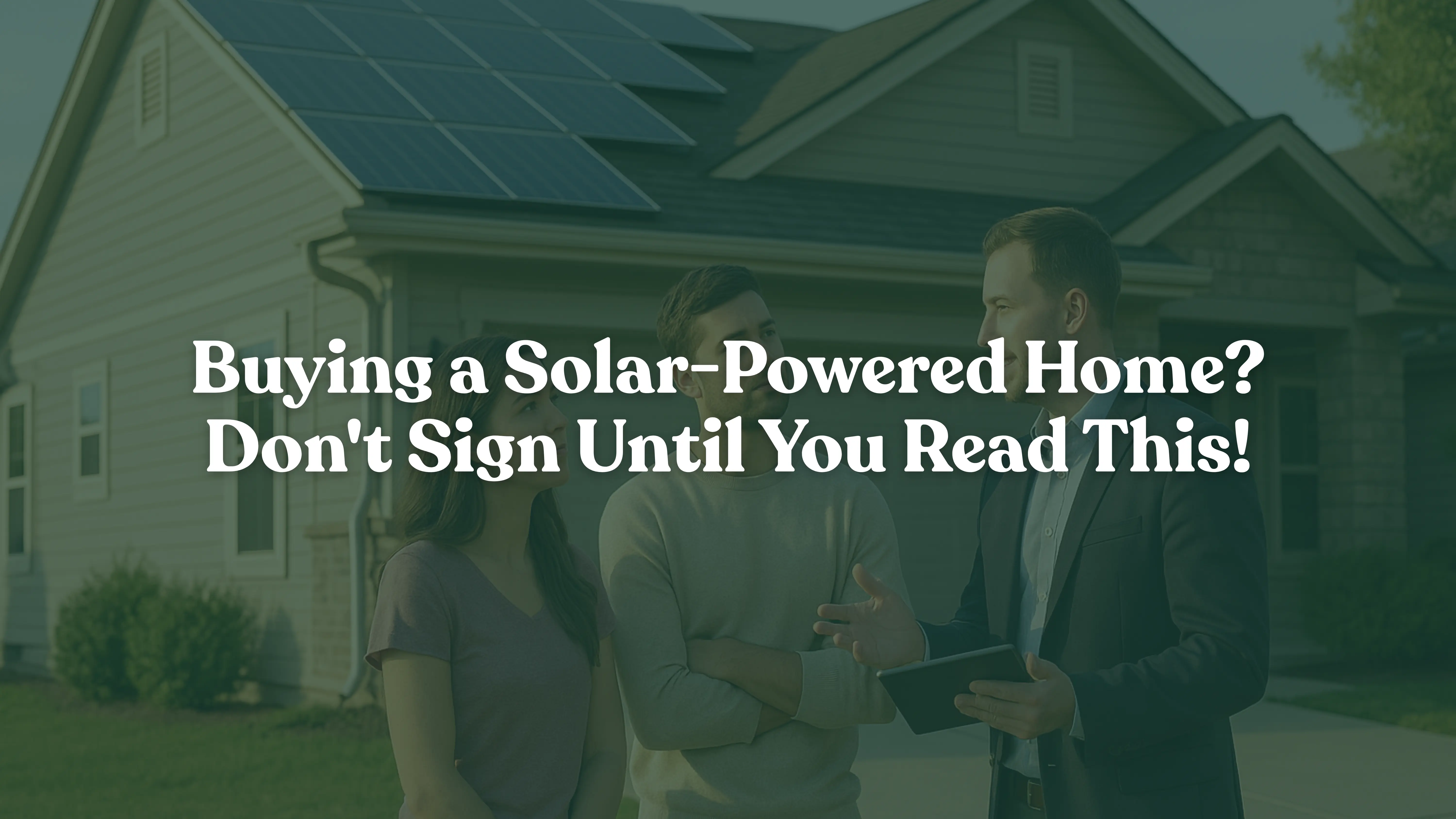Buying a Solar-Powered Home? Don’t Sign Until You Read This!

Buying a Solar-Powered Home: What Solar Installers Need to Know
Here’s a scenario playing out in real estate offices across America right now: A homebuyer falls in love with a property, then discovers it has solar panels. Suddenly, they’re drowning in questions. Who owns the system? What about warranties? Will their mortgage even get approved? As solar installers and EPCs, you know these questions can make or break deals. The good news? When you arm real estate professionals and homebuyers with the right information, you’re not just closing deals—you’re positioning yourself as the go-to solar expert in your market.
This guide gives solar installers and EPCs everything you need to educate clients about buying a solar-powered home in 2025. From ownership structures to financial considerations, we’re breaking down the critical details that turn nervous buyers into confident homeowners.
Who Actually Owns the Solar Panels? The Make-or-Break Question
Before any homebuyer signs on the dotted line, they need one critical answer: Who owns this solar energy system? This question determines everything from financing approval to long-term costs.

There are three ownership scenarios you’ll encounter when buying a solar-powered home:
Fully Owned Systems: The cleanest situation. The seller bought the system outright or completed their solar loan payments. Ownership transfers directly with the property. According to Department of Energy studies, owned solar systems can increase home value by roughly $15,000. This should be your easiest conversation with potential buyers.
Leased Solar Systems: The equipment belongs to a third-party company. The homeowner makes monthly lease payments, and the buyer must either qualify to take over the lease or negotiate for the seller to buy it out. Credit requirements vary by company, so buyers need specifics upfront.
Power Purchase Agreements (PPAs): Similar to leases, but homeowners pay for the electricity generated rather than equipment rental. Watch for rate escalation clauses that increase costs over time. These need careful review before purchase.
As an installer, create a simple solar system evaluation checklist for local real estate agents. This establishes you as the area expert and generates qualified leads from agents who need help navigating solar transactions.
System Age, Performance, and Equipment Condition Matter
Most residential solar panel installations last 20-25 years, but performance decreases over time. Smart buyers need real data, not just sales promises.
Here’s what every homebuyer should verify:
Installation Date: A 5-year-old system versus a 15-year-old system represents vastly different remaining value. Panel efficiency typically drops 0.5-1% annually. Do the math for your buyers—show them exactly what production they can expect.
Historical Production Data: Request monitoring reports showing actual energy generation versus projected output. Significant underperformance signals potential problems like shading issues, equipment failures, or poor installation quality.
Inverter Status: String inverters generally last 10-15 years and often need replacement during the panels’ lifetime. Microinverters typically match panel longevity. If you spot an aging string inverter, factor replacement costs into the buyer’s budget.
Smart move for solar installers: Offer complimentary system assessments for homes on the market. This creates opportunities to connect with sellers needing upgrades and establishes you as the trusted expert for incoming buyers.
Solar Warranties and What Actually Transfers to New Owners
Warranty confusion stops deals cold. Homebuyers panic when they can’t get clear answers about coverage and duration.

Break it down into three warranty types:
Equipment Warranties: Solar panels typically carry 25-year production warranties guaranteeing 80-85% output. Inverters have separate coverage. Most equipment warranties transfer with proper documentation, but buyers need written confirmation.
Installation Workmanship Warranties: Cover roof penetrations and mounting, usually for 5-10 years. If your company did the original installation, this is your opportunity to build a relationship with the new homeowner and secure future maintenance contracts.
Performance Guarantees: Some installers guarantee production levels. Verify whether these guarantees transfer and what compensation applies if the system underperforms.
The biggest worry for buyers? What happens if the original solar installer went out of business? Equipment warranties remain valid through manufacturers, but buyers need qualified installers—that’s you—for service and repairs. This is exactly why building relationships with real estate agents pays dividends.
Money Matters: Tax Credits, Incentives, and Net Metering Explained
Let’s talk finances—specifically what transfers when buying a solar-powered home.
Federal Solar Tax Credit: The 30% federal Investment Tax Credit only applies to original installations. Previous owners already claimed it, so buyers can’t claim it again. However, the system still delivers value through ongoing electricity savings.
State and Local Incentives: Programs vary dramatically by state. Some Solar Renewable Energy Certificate (SREC) programs may transfer to new owners. Research your local programs and create a quick reference guide your real estate partners can share.
Net Metering Agreements: This is crucial. Utility agreements crediting homeowners for excess energy sent to the grid must transfer to new owners. Full retail credit versus partial credit significantly impacts savings. Make sure buyers understand their utility’s specific policies.
Calculate real numbers. Show buyers estimated monthly savings based on historical production and current utility rates. As installers, this means staying current on local utility policies and rate structures.
Essential Documentation Every Solar System Needs
Here’s how to differentiate your company: comprehensive documentation packages.
When you complete a solar panel installation, provide homeowners with a complete transfer folder including:

- Original purchase agreement or lease/PPA documents
- All equipment specifications and warranty certificates
- Installation permits and final inspection approvals
- Net metering agreement with the utility company
- System monitoring platform access credentials
- Complete production history and maintenance logs
- Roof condition assessment from installation date
Homes with well-documented solar systems sell faster and command higher prices. When you provide this documentation level upfront, sellers remember you for their next home—and recommend you to their buyers.
Roof Replacement Costs Nobody Talks About
Here’s the uncomfortable reality that tanks deals: Buyers discover the roof needs replacement soon, and removing and reinstalling solar panels costs $3,000-$8,000 depending on system size.
Be proactive. When assessing a home with solar panels for potential buyers, carefully inspect roof condition. Industry experts recommend replacing asphalt roofs older than 5-10 years before solar panel installation.
Create value by offering bundled services. Partner with reputable roofing contractors. Provide package pricing for roof replacement and solar reinstallation. This removes a major buyer objection and opens an additional revenue stream.
How Solar Systems Affect Home Financing
Lenders care about solar panels, and different ownership structures receive different treatment.

Owned Systems: Generally increase property value without financing complications. Most lenders view them as permanent improvements similar to renovated kitchens or new HVAC systems.
Leased Systems and PPAs: Can complicate mortgages. Some lenders require lease buyouts before closing. Others need proof the buyer qualifies for lease assumption. FHA and VA loans have specific solar lease requirements.
Your role isn’t providing mortgage advice, but maintain relationships with local lenders who understand solar financing. Create a preferred lender list for your real estate partners—this positions you as a comprehensive resource.
Critical Questions Buyers Should Ask Solar Installers
Empower homebuyers with proper due diligence questions. Create a downloadable checklist on your website that real estate agents can distribute to clients.
Essential questions include:
- Is this solar energy system properly sized for the home’s consumption patterns?
- Are there unresolved building code violations related to the installation?
- What happens if panels are damaged during my ownership?
- Can the system expand for electric vehicle charging?
- Who provides ongoing monitoring and maintenance services?
- What shade analysis was performed before installation?
When buyers consult you about properties they’re considering, provide honest evaluations. If a system is undersized, poorly installed, or problematic, say so. This credibility generates referrals and future business.
Navigating the 2025 Solar Market with Expert Partners
The solar industry is evolving fast. With the federal solar tax credit expiring December 31, 2025, there’s unprecedented urgency around new installations—though existing systems continue delivering value regardless of installation date.
Technology improvements mean modern systems generate more power per panel, and costs have dropped significantly. According to Sunscape Solar, innovative solar technologies and streamlined processes are making solar energy increasingly accessible nationwide.
Here’s the reality: The resale market for homes with solar panels is exploding, and homebuyers need expert guidance to navigate these transactions.
That’s where Energyscape Renewables comes in. We offer comprehensive services throughout the entire ownership journey—from pre-purchase assessments to post-purchase maintenance and upgrades. Whether you’re a homebuyer, seller, or real estate professional, our team provides transparent evaluations, documentation assistance, seamless transfers, and ongoing maintenance.
Don’t let solar confusion derail your transaction. Contact Energyscape Renewables today to schedule your consultation and navigate the solar-powered home buying process with complete confidence.

sjayakanth@energyscaperenewables.com